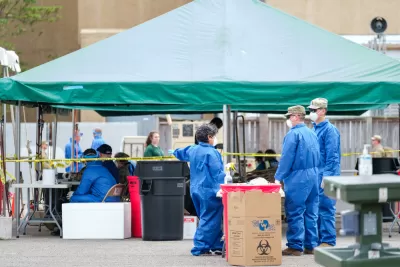The United States currently tests about 145,000 people daily. A Harvard study calls for a minimum of 500,000 daily, but that's on the low end if the country wants to prevent shutting down again due to a second wave of the coronavirus.

"An average of 146,000 people per day have been tested for the coronavirus nationally so far this month, according to the COVID Tracking Project, which on Friday reported 3.6 million total tests across the country," reports Keith Collins for the New York Times on April 17.
To reopen the United States by mid-May, the number of daily tests performed between now and then should be 500,000 to 700,000, according to the Harvard estimates.
The problem with the testing now is that the percentage of positive test results is too high, about a sign that the level of testing is insufficient.
“If you have a very high positive rate, it means that there are probably a good number of people out there who have the disease who you haven’t tested,” said Ashish Jha, the director of the Harvard Global Health Institute. “You want to drive the positive rate down, because the fundamental element of keeping our economy open is making sure you’re identifying as many infected people as possible and isolating them.”
The researchers said that expanded testing could reduce the rate to 10 percent, which is the maximum rate recommended by the World Health Organization. In Germany, that number is 7 percent, and in South Korea, it is closer to 3 percent. [According to Robinson Meyer and Alexis C. Madrigal of The Atlantic, it's 2 percent.]
The Harvard researchers that the rate of daily testing should be at a minimum of 152 tests per 100,000 people each day, a level reached only by Rhode Island. New York, which has conducted the most tests, is testing at 118 per 100,000 people.
A shortage of test kits and technical flaws in the United States significantly delayed more widespread testing of the virus, letting it spread undetected for weeks. With [almost 753,000 cases as of Sunday], the country has the highest number of known cases in the world. [Also on April 19, U.S. deaths from COVID-19 topped 40,000.]
Jha says that we'll have made progress when the current restrictions on testing have been eliminated.
“We need to switch from saying to people, ‘if you have mild symptoms, if you’re not feeling super sick, don’t come and stay at home,’ to ‘if you have any symptoms, you need to come in to get tested right away,’ ” he said.
New study calls for 5 million daily tests (to start)
Jha's colleague, Danielle Allen, a professor at Harvard University's Edmond J.Safra Center on Ethics, is the lead author of a report titled "Roadmap to Pandemic Resilience," set to be released on Monday, that calls for a much higher level of testing combined with two other public health strategies, reports ABC News on April 19.
"What people need to recognize is that a massively scaled-up testing, tracing and supported isolation system is the alternative to national quarantine," Allen said. "We all had to learn PPE [Personal Protective Equipment] and we all had to learn about flattening the curve ... now we have to learn about TTSI."
Test producers will need to deliver 5 million tests per day by early June to safely open parts of the economy by late July, according to the report. To "fully re-mobilize the economy," the country will need to see testing grow to 20 million a day, the report suggests.
Some experts, including Nobel laureate economist Paul Romer, who did not assist in the report but has a similar approach, estimate the country may need more than 30 million tests per day.
Allen appeared on ABC This Week on Sunday morning. George Stephanopoulos, the host, asked her to explain the danger of economic shutdowns being lifted before adequate testing is in place which could lead to future stay-at-home orders resulting from potential second and third waves of the virus.
Calling that approach "adaptive response" in disease control, she said that makes sense when dealing with a contained epidemic, "but it doesn't make sense when you have a global pandemic when entire countries are experiencing the disease, stressing the need for enough "testing, tracing, and supportive isolation to control the disease so we don't see a resurgence."
She then emphasized what Jha said earlier, the testing rate show a reduced percentage of positive results to match South Korea's level of 3 percent.
The blue-ribbon panel the authored the report consists of more than 45 economists, social scientists, lawyers and ethicists. As of posting time, a link to the report was unavailable. Look for it in the comments section below.
Additional reading:
- "The case for ending the Covid-19 pandemic with mass testing," by
-
"Opinion: The best way out of this pandemic is to massively scale up testing. Here’s how to do it," by Danielle Allen, The Washington Post, Apr 10, 2020
FULL STORY: Coronavirus Testing Needs to Triple Before the U.S. Can Reopen, Experts Say

Planetizen Federal Action Tracker
A weekly monitor of how Trump’s orders and actions are impacting planners and planning in America.

Map: Where Senate Republicans Want to Sell Your Public Lands
For public land advocates, the Senate Republicans’ proposal to sell millions of acres of public land in the West is “the biggest fight of their careers.”

Restaurant Patios Were a Pandemic Win — Why Were They so Hard to Keep?
Social distancing requirements and changes in travel patterns prompted cities to pilot new uses for street and sidewalk space. Then it got complicated.

Platform Pilsner: Vancouver Transit Agency Releases... a Beer?
TransLink will receive a portion of every sale of the four-pack.

Toronto Weighs Cheaper Transit, Parking Hikes for Major Events
Special event rates would take effect during large festivals, sports games and concerts to ‘discourage driving, manage congestion and free up space for transit.”

Berlin to Consider Car-Free Zone Larger Than Manhattan
The area bound by the 22-mile Ringbahn would still allow 12 uses of a private automobile per year per person, and several other exemptions.
Urban Design for Planners 1: Software Tools
This six-course series explores essential urban design concepts using open source software and equips planners with the tools they need to participate fully in the urban design process.
Planning for Universal Design
Learn the tools for implementing Universal Design in planning regulations.
Heyer Gruel & Associates PA
JM Goldson LLC
Custer County Colorado
City of Camden Redevelopment Agency
City of Astoria
Transportation Research & Education Center (TREC) at Portland State University
Camden Redevelopment Agency
City of Claremont
Municipality of Princeton (NJ)





























